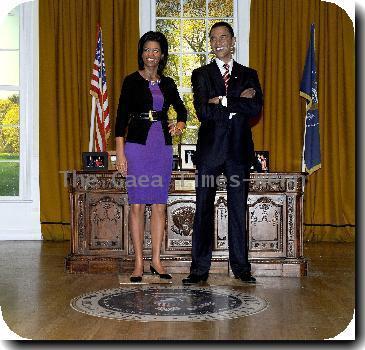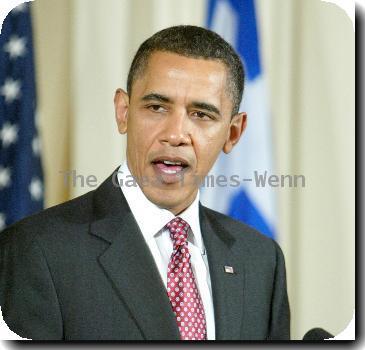Fla. GOP Senate candidate Rubio faces test of politics, ethnicity in courting Hispanic vote
By Christine Armario, APFriday, June 4, 2010
Fla. Senate candidate tests politics, ethnicity
MIAMI — At a boutique hotel in Miami’s upscale Coral Gables neighborhood, members of a Republican women’s group smile and gush as Senate candidate Marco Rubio enters the room. A Spanish-language television reporter approaches with a microphone.
What is his stance on the Arizona immigration law? Does he favor amnesty for undocumented immigrants?
“I don’t support amnesty,” Rubio says. “I support a legal immigration system.”
A Cuban-American lawyer and former state House speaker, the 39-year-old Rubio has captured the attention of national Republicans hoping to attract Hispanic voters, a majority of whom voted for President Barack Obama in 2008.
But it’s among Hispanic voters that some of Rubio’s conservative positions could prove divisive.
Last fall he opposed the nomination of Sonia Sotomayor, the country’s first Hispanic Supreme Court justice, saying he had concerns about her case history and testimony on issues such as the Second Amendment right to bear arms. He opposes counting undocumented immigrants in the U.S. census and providing them a pathway to citizenship.
He suggested in an interview with a conservative publication, Human Events, that even illegal immigrant children who have spent most of their lives in the U.S. shouldn’t be allowed to stay. He later told The Associated Press: “Young children have to go wherever their parents are.”
And after initially expressing concerns about Arizona’s immigration law, the nation’s harshest, Rubio reversed his position and came out in support, saying subsequent changes aimed at preventing racial profiling have greatly improved it.
“Most people, what they know about Marco Rubio is that he’s a young, well-spoken guy who’s Hispanic,” said Rep. Juan Zapata, a Republican state representative in Florida who was born in Colombia and supports Rubio’s rival Gov. Charlie Crist. “People don’t know the details.”
Zapata said that the Hispanic community would love to support a Latino candidate but that Rubio’s views don’t further the causes of Hispanic voters.
“I’ve known him for a long time and I’ve worked with him and I’m terribly disappointed in the positions he’s taken,” he said.
Ana Gomez Mallada, a Republican Cuban-American who is supporting Rubio, said his stance on the Arizona law is “probably irrelevant” with Cuban-American voters.
“Will it hurt him with other segments of the Spanish speaking voters? Probably, but not too many,” Mallada said. “A lot of segments of Hispanics voters are Democrats anyway and would not vote for Marco anyhow.”
Both of Rubio’s opponents, Crist, who is running as an independent after Rubio’s success forced him from the GOP, and the Democratic front-runner, Rep. Kendrick Meek, oppose the Arizona law.
Meek, a former Florida Highway Patrol trooper, called the law intrusive and said it wasn’t fair to ask law enforcement “to judge a book by its cover.” He said that Rubio changed his position in order to appeal to the far right of the Republican Party and that a law like Arizona’s would be wrong for Florida and “wrong for a segment of people that would take great pride in his election.”
Rubio says he is pro-immigrant and doesn’t believe his viewpoints on immigration are out of line with constituents.
“I think Hispanic voters in America are in favor of the laws being followed,” he said in an interview with the AP.
Hispanic voters have often voted in favor of ethnicity, but they also have opposed Latino candidates.
In 2001, Latino voters in Houston — mostly Democratic Mexican-Americans — supported Orlando Sanchez, a Cuban-American mayoral candidate who is a conservative Republican. Five years later, Henry Bonilla, a Mexican-American incumbent running for Congress in Texas, lost to a Democratic challenger, also Hispanic, in part because Latino voters felt he was out of touch with their viewpoints, some even calling him “Henry Vanilla.”
Former Sen. Mel Martinez, a Cuban-American Republican whose seat Rubio is vying to fill, said the GOP needs to highlight aspects of its beliefs that are consistent with the views of Latino voters. Latinos tend to be strongly religious and against abortion and tilt conservative on social issues.
“I think our party speaks to the hopes and wishes of many Hispanic values,” Martinez said.
Others say linking conservative values to conservative politics won’t necessarily translate into votes.
“We’re conservative, but we vote liberal” is the cliche among Mexican-American voters in Texas, said Tatcho Mindiola, director of the Center for Mexican American Studies at the University of Houston.
“I think that race, ethnicity, whatever term you use to call it, is a very important factor in these elections, especially for minority groups,” Mindiola said. “The question is always how much of a factor these elements play.”
Florida has long been the exception among Latino voters. Whereas most Latinos in other states vote Democratic, in Florida a strong bloc of anti-Castro Cuban-Americans has traditionally voted Republican. That is changing, with younger generations and more recent immigrants trending Democratic and Cuban-Americans representing a smaller proportion of the Latino electorate.
In 2008, exit polls showed that just over half of Florida Hispanics voted for Obama — a smaller margin than what he received nationally, where roughly two-thirds of Hispanics favored him over Republican Sen. John McCain. Four years earlier, President George W. Bush received slightly more than half of Florida Hispanics’ votes, while his Democratic challenger, Sen. John Kerry of Massachusetts, won just over half of Hispanics’ votes nationally.
Rubio said his message to the Latino community is one of economic empowerment.
He also said he wants a federal solution to illegal immigration that would focus first on securing the border and at some point employment enforcement.
Crist recently gathered supporters at a cigar shop in Miami. Afro-Cuban music played in the background. Cigars were rolled and sealed with a blue “Charlie Crist for U.S. Senate” label.
Franco Caliz, 21, a Democrat whose family is from Nicaragua, was one of many at the event.
Rubio is “flip-flopping, I think, on the most important issue to Latinos right now, which is the Arizona immigration (law),” Caliz said of Rubio. “I don’t think ethnicity matters. I think what matters is his ideology.”
Tags: Arizona, Barack Obama, Caribbean, Cuba, Florida, Hispanics, John Kerry, Latin America And Caribbean, Miami, North America, Political Issues, Senate Elections, United States





